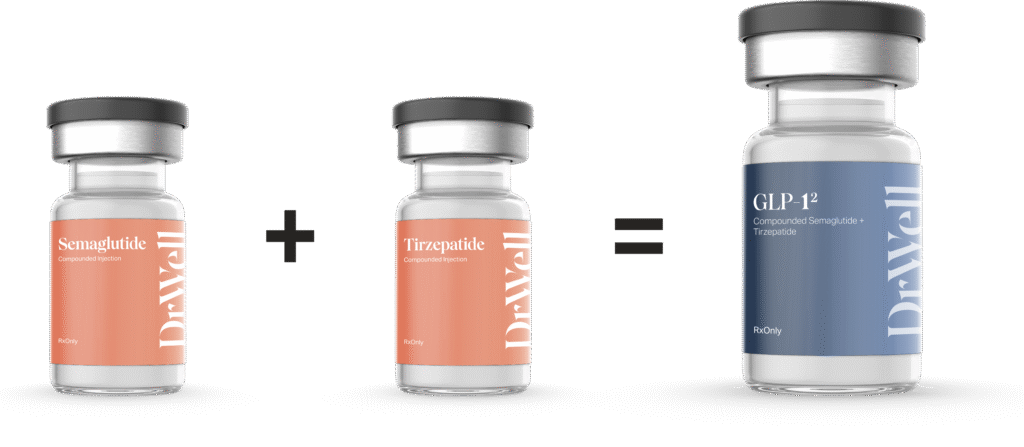While coaching her weight management patients, Jennifer “Coop” Cooper, APRN, nurse practitioner in the office of Dr. Jonathan Kaplan, and Chief Nursing Officer at DrWell, noticed patients who switched from semaglutide to tirzepatide had better appetite suppression but an increase in food noise whereas patients on semaglutide had greater food noise reduction but less appetite suppression. From these conversations, the idea of combining the two medications (semaglutide and tirzepatide), but at lower individualized doses, was born.
In cooperation with our compounding pharmacy partners, DrWell is now able to offer compounded medication that
combines semaglutide and tirzepatide, GLP-12, if your prescriber determines it is medically necessary during a visit.
Is it ok to combine medications?
If medically necessary for a patient, healthcare providers can prescribe compounded medications with similar mechanisms of action to gain greater control of the patient-specific disease process being treated. Common examples include insulin-dependent diabetics taking short-acting and intermediate-acting insulin, and medications for high blood pressure like ACE inhibitors (lisinopril) and angiotensin receptor blockers (losartan).
Is it ok to combine two medications that are components of FDA-approved medications, if those FDA-approved medications were originally indicated for diabetes?
Yes, but it depends on the patient’s specific needs. If a patient, after consulting with a prescriber, has a specific medical need that cannot be met with an FDA-approved medication, then patients can be prescribed patient-specific compounded medications that may include, if appropriate, two or more active ingredients that would be impractical or impossible to administer with two separate prescription orders for each medication to fit the patient’s unique needs.
What kind of testing and standards apply to compounded medications?
There are myriad processes that are imposed on compounding pharmacies to ensure that the active pharmaceutical ingredients (APIs), like tirzepatide and semaglutide, are suitable for compounding. First, compounding pharmacies have to comply with standards set by the state boards of pharmacy to operate compliantly. These standards include
obtaining the active pharmaceutical ingredients from an FDA-registered manufacturer who provides the pharmacy with a certificate of analysis (COA). A COA is a document that confirms the purity and activity of the drug substance. Compounding pharmacies must also perform suitability and sterility testing.
Who is a candidate?
Consult with a healthcare provider to determine what medication, if any, fits your medical needs.
